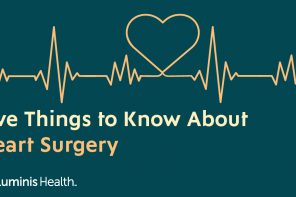Heart disease affects lots of people and can be fatal. In fact, it is for over 600,000 people in the U.S. every year. That’s a scary number, made scarier still when you consider that many people who are at risk for acquired heart disease don’t know it. Here is what you should know:
What causes it?
There are many kinds of heart disease, from arrhythmias that affect your heartbeat to heart infections and more. But when it comes to acquired heart disease, the most common culprit is plaque (a substance that can build up in arteries.) If enough plaque sticks to the sides of your arteries, the passages for blood through your arteries can narrow, causing blood to reach your heart less easily. Plaque buildup is the leading cause of coronary artery disease (CAD) and of heart attack.
Who is at risk?
Heart disease can affect anyone at any age. You likely already know that having other chronic health issues, such as high cholesterol, high blood pressure and diabetes, can increase your risk of developing heart disease — and that your age, gender and family history are also contributing factors. However, you may be surprised to learn that lifestyle choices, such as unhealthy eating and lack of physical activity, are the leading cause.
What are the symptoms?
Heart disease is sometimes referred to as a “silent” disease. That’s because heart disease and the conditions that lead to it, including high blood pressure and high cholesterol, often have no symptoms. And that means that, sometimes, the first sign of heart disease is a heart attack.
Signs of a heart attack may include:
- Cold sweats
- Discomfort or pain in the chest, jaw, neck or back
- Feeling dizzy, weak or lightheaded
- Feeling sick to your stomach
- Shortness of breath
If you think that you or someone else is having a heart attack, don’t wait — call 9-1-1 right away.
Is it diagnosable?
Sometimes acquired heart disease can be diagnosed by a doctor through a series of chest x-rays, exercise stress tests and other diagnostic tools. If you’re concerned about heart disease, talk with your doctor about what tests might be right for you.
Is it preventable?
Making healthy lifestyle choices can lower your chances of acquiring heart disease. Quitting smoking, eating a healthy diet, maintaining a healthy weight and getting regular physical activity (150 minutes of moderate-intensity activity per week) are a great place to start.
If you have another condition such as high blood pressure, high cholesterol or diabetes, make sure to talk to your doctor about the best way to manage your health.
Your doctor may be able to recommend lifestyle changes you can make right away to start living healthier. They can also recommend medication to treat heart disease or its cause, if necessary.
This post originally ran in the Enquirer-Gazette.
 Leighton Forrester, MD, is a cardiologist at Luminis Health Doctors Community Medical Center.
Leighton Forrester, MD, is a cardiologist at Luminis Health Doctors Community Medical Center.




